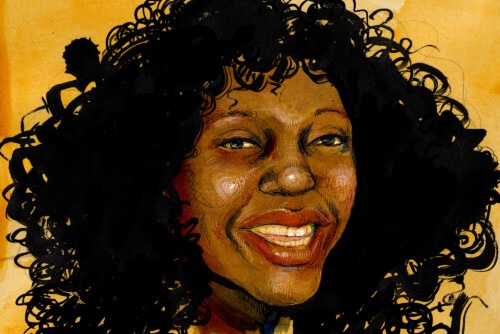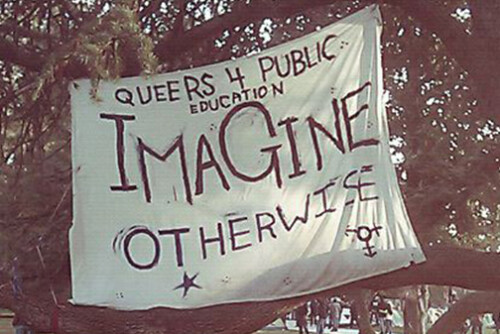A response to a discussion with Wildness filmmakers Wu Tsang and Roya Rastegar. This conversation took place on March 1, 2013 and kicked off the The Scholar & Feminist Conference 2013: “Utopia.” Watch the video here:
A year ago, Wu Tsang and Roya Rastegar, directors of the magical-realist documentary Wildness, joined Janet Jakobsen in a dialogue that opened the Barnard Center for Research on Women’s (BCRW) unforgettable Utopia Conference. Not only did this conversation leave me with a deepened appreciation of this film for its compositional richness, but it also brought me to think about failure as necessary for substantive social change. Is “successful failure” an oxymoron, or is it an inevitable means to the radically equitable end we are all dreaming of?
The world of Wildness is vibrant, humorous, and in a constant state of transition. The film focuses on the Silver Platter, a working-class Latino gay bar in Los Angeles that becomes the site of Wildness, a weekly party thrown by Chicago transplant Wu Tsang and his friends. The party attracts young, white (though not exclusively) hipster city-dwellers, a demographic not typically hosted by the club. However like Silver Platter regulars, they desire a safe space to be who they are out of sight of the mainstream’s disapproving gaze. The film takes us through the trajectory of Wildness at the Silver Platter, the legal activist work that emerged from it, and the communities that are formed, fortified, and dissolved in the process.
In the discussion at Barnard, Tsang spoke of looking at photographs from civil-rights movements throughout history and feeling disconnected from them. For Tsang, the representations of hopeful solidarity captured in these images seemed to be romanticizations of a bygone era: “Why is it that none of these things are actually really what I experience in my daily life?” Tsang wondered. Wildness, as both a social space and a film, was a project born from a need to feel connected—to a movement, to others, and to the present. “I didn’t want to over-intellectualize [the connections]. I wanted to make them felt,” Tsang reflected. In Wildness, emotion and sensation are elevated as critical forms of logic that guide viewers through the networks of relationships that define the Silver Platter.
Tsang and Rastegar described their film as a “magical realist documentary,” which admittedly confused me when they first used the term during the discussion. How could a documentary—purportedly a truth-telling genre driven by the desire for authentic representation—also be a fantasy? As the directors explained their rationale, my understanding of documentary film was completely uprooted. “We didn’t want people to come away with some kind of a sense of truth. We wanted people to experience a story,” Rastegar explained. Tsang and Rastegar brilliantly negotiate the obligation of telling the “truth” by personifying the Silver Platter as a character with its own subjectivity and analysis of the world it inhabits. Tsang and Rastegar encourage viewers to reject the need to “know what really happened,” because that is simply not the point; guided by the omnipresence of the Silver Platter’s many voices, viewers are asked to trust the slipperiness between memory and myth and accept that middle ground as truth. As Tsang emphasized in the discussion, “the realness [of Wildness] is about the feelings one could have.”
Through Wildness, we learn that creation myths are essential to community formation and solidarity, as they help us discover our point of origin and envision our future. The magical-realist lens of the film allowed for Tsang and Rastegar to combat the all-too-real burden of representation—a burden that flattens the existence of contradiction and the multidimensionality of human experiences. In order to subvert the notion of a singular POC or queer subjectivity, “we have to start creating our own representations and our own stories,” Rastegar insisted, citing Wildness as one of these stories. Mysticism and spirituality are not indulgences but are means through which we can connect to our humanity, conceive of our longevity and our legacy.
Wildness also teaches us that it is just as important to envision utopia as it is to accept the inevitability of its failure. It confronts viewers with the friction caused by internal conflict and the painful realities of gentrification, deportation, poverty, burnout, and death. The Silver Platter closes and the Wildness party ends, but the unspeakable feeling incubated in the space is an undying radical act, and for that, the Silver Platter failed successfully and with dignity. Like people, social movements are living and breathing organisms that are conceived, come to maturation, inspire hope, fear, and love, and then, ultimately, die. Thankfully, they can also be reborn.




